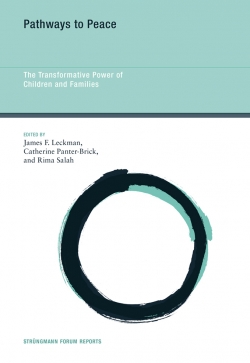Peace is a Lifelong Process
Peace is a Lifelong Process
Chapter 1 authors: James F. Leckman, Catherine Panter-Brick, and Rima Salah
A Conceptual Journey
- How does human biological development impact peacebuilding?
- How do events and relationships in childhood set the stage for peace at personal and social levels?
- Given multiple challenges in society, what kinds of early childhood interventions have potential for promoting peace?
- How can we use new knowledge about child development and its contexts to create effective programs and policies that will reduce violence and promote peace?
What is Peace?
There are many definitions of peace, but all of them are rooted in notions of individual flourishing, cooperation, mutual respect, and justice. It is one thing for children to be healthy, but an ideal world would foster children who are also peaceful—children who have the capacity for empathy, respect for others, commitment to fairness, and trust in relationships with other people.
What Can Biology Teach Us?
Biobehavioral mechanisms, including those involving neuropeptides like oxytocin and vasopressin, underlie the development of social bonds between and among parents and children. Evidence from epigenetics suggests that interventions to strengthen families, improve children’s cognitive wellbeing, and promote children’s socioemotional health can have transgenerational consequences.
Threats to Well-being in Societies
Today in the modern world, countless children live in environments with inadequate foundations for optimal health and development; many children must also endure violence, whether it be direct or structural. Shifting from a narrow goal of poverty elimination to a broader goal of equity promotion could remedy many of the economic, social, and political conditions that adversely affect so many children.
Lessons Learned
There are several important lessons to be learned from contemporary research. First, early childhood is an optimal period during which human capital is developed and formed. Second, family-based interventions are effective and can permeate entire communities in a bottom-up fashion; notable examples include the Turkish Early Enrichment Project and the Chicago Longitudinal Study. One of the biggest challenges facing this subset of research involves the current difficulty of directly assessing peace promotion variables.
Global Citizenship
A global citizen must ask, “What changes are necessary so that each of us takes responsibility for looking after each other and our planet?” Part of the answer might lie in understanding and leveraging two basic propensities of human nature, namely selfish assertiveness and prosociality. Next Steps Noting the proven effectiveness of early childhood development programs vis-à-vis peacebuilding, the Early Childhood Peace Consortium has several important goals:
- Spreading recognition of the power of early development to promote prosociality, diminish selfish assertiveness, and reduce and prevent violence
- Creating a platform to advocate for change using bottom-up approaches to inform future research, policy agendas, and programs
- Strengthening established and emerging networks around children and peace
JOIN THE CONVERSATION
For breaking news and to stay connected, follow us on social media. Sign up to get our E-News delivered straight to your inbox.

